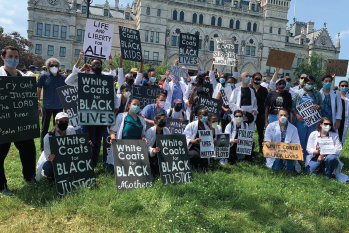I believe when people hear about racism’s painful effects from people they love and value, they can transiently feel their pain, and that experience makes them want to take a stance against injustice. —Shannon D. Fayson, MD
Explore This Issue
October 2020
Dr. Esianor also organized an informal discussion among his resident cohorts to discuss recent events. “People who may not know as much about racial injustice among the Black community had the opportunity to ask questions,” he explained. “As a Black man, I was able to share some of my personal experiences. I thought there was a need to break the ice and discuss these matters together, as we’re a close-knit group. If we can’t have these conversations among ourselves, who can we have them with?”
Ongoing Initiatives
Although George Floyd’s death was a wake-up call for many, anti-racism efforts certainly aren’t anything new among medical institutions. Kaiser Permanente has had an equity, inclusion and diversity committee for decades. In Dr. Yoshikawa’s department, trainings have included topics on implicit bias, cultural humility, and the myth of meritocracy, grand rounds talks have focused on the history of racism in medicine, and book clubs have used literature to examine the intersection of healthcare and culture.

University of Connecticut otolaryngology residents David Wilson, MD, and Roshansa Singh, MD, (standing second and third, from right, respectively) and Lawrence Kashat (seated row, second from right) participating in the White Coats for Black Lives movement during the June 6, 2020, BLM March in Hartford, Conn.
© Courtesy Kourosh Parham, MD, PhD
Work by Carrie L. Francis, MD, associate professor in the department of otolaryngology–head and neck surgery at the Kansas University School of Medicine in Kansas City, and her colleagues has been ongoing for years. Some of their most significant and longitudinal initiatives include a biennial simulation otolaryngology open house event that allows medical, post-baccalaureate, and undergrad students to experience common otolaryngology procedures. This event is co-sponsored with two student groups that support students of color traditionally underrepresented in medicine and that advocate for the health needs of underserved communities and communities of color. As a result, more medical students of color are introduced to otolaryngology early in their journey.
Other initiatives include developing funded research and clinical electives. In an effort to enhance DEI efforts, Dr. Francis developed a lectureship that offers a campus-wide opportunity to share diversity and inclusion efforts, as well as health equity expertise, with the healthcare system and community.
Keith A. Chadwick, MD, MS, who earlier this year was a Sean Parker Fellow in laryngology at Weill Cornell Medicine in New York City and is now an assistant professor in the department of surgery, division of otolaryngology–head and neck surgery, at Stony Brook University in Stony Brook, N.Y., said that numerous efforts at Weill had been underway for decades to promote anti-racism and inclusion, and many have ramped up in response to current events. The Weill Cornell Medicine system took several immediate steps to actively combat systemic racism during his time there, including: